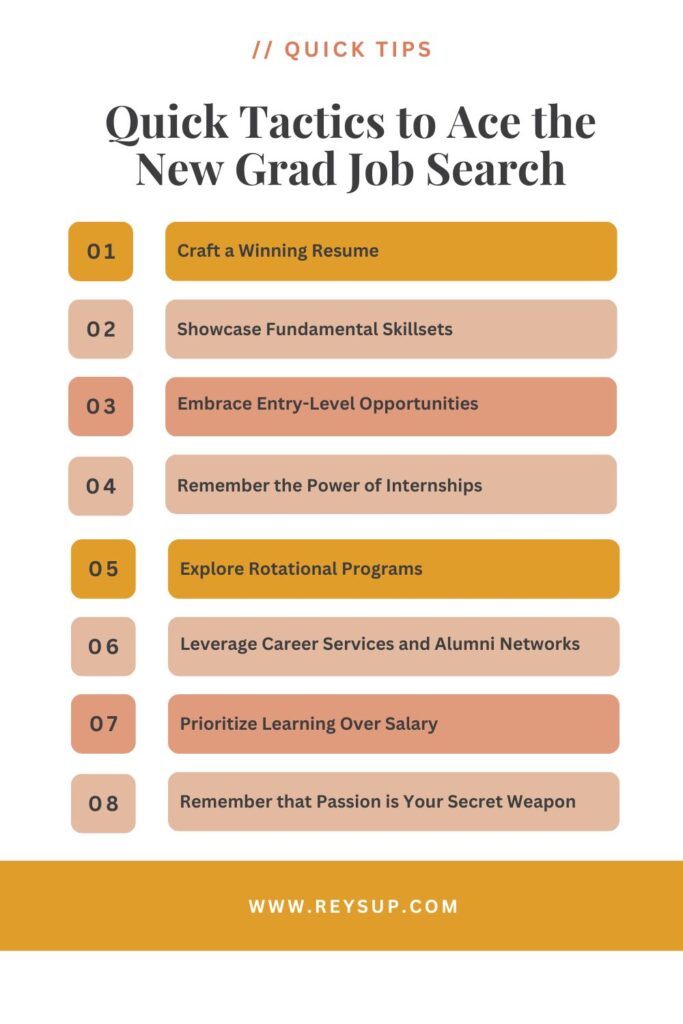In this article, we are sharing tactics to ace the new grad job search – so you can kick start your career in a role that you love.

Congratulations, graduate! You’ve crossed the stage, thrown your cap, and now it’s time to tackle the next big challenge: finding your first job. The transition from student to professional can feel daunting, but with the right strategies and prioritization, you can navigate this exciting phase of your life with confidence.
And so, we are excited to bring you this guide to help you kickstart your career on the right foot!
Tactics for the new grad job search

1. Crafting a Winning Resume
The first tactical step to finding your first job is writing your resume. You might have already begun this process during college, or perhaps you haven’t started documenting your achievements and projects on paper. Don’t worry if that’s the case!
When it comes to your first ‘professional resume’, it is crucial to tailor it to highlight the classes, projects, and internships that directly relate to the job you’re applying for. Recent graduates often lack extensive work experience, so the next best thing you can do is emphasize your academic achievements and relevant coursework.
Did you lead a team project that showcases your organizational skills? Or perhaps you completed a complex research paper that demonstrates your analytical abilities? These are valuable details that employers want to see so make sure you highlight them!
Also Read Top 20 Situational Job Interview Questions and How to Answer Them
Below are some sections you should ensure are included in your resume:
- Relevant Projects & Work Experience
- If you don’t have a ton of bullets showing “work experience”, you can create a bullet for each large project you have completed in your classes. These projects oftentimes will serve as the examples you use to show you have what it takes to operate in a real-life scenario.
- Relevant Classes & Coursework
- Do not list every single class you took. Instead, include ones that are relevant to the industry you are applying for.
- Education
- Include your major, minor (if you have one), and GPA (if it is over 3.0)
- Include any special distinctions like cum laude, phi beta kappa, or general honors
- Skillsets
- Include skills that are relevant to the job you are applying to
- Languages, Tools, & Software Programs
- If showing you speak another language or know a specific software (like Salesforce) will set you apart, make sure to include it in this section.
Check out more tips on resume writing in our article here.
2. Showcasing Fundamental Skillsets
Most recruiters who are responsible for bringing entry level talent into the workplace understand that candidates will not have extensive work experiences. Therefore, they tend to focus on other fundamental competencies like organization, communication, an eagerness to learn, and adaptability.
Make sure to highlight these qualities in your resume and during interviews. Share examples of times when you successfully managed deadlines, communicated effectively in a team setting, or quickly adapted to changes in a project. These soft skills are often what differentiate one entry-level candidate from another.
Below are some questions to help get you started:
- Tell me how you manage deadlines? How do you stay organized and ensure you complete the task/project on time?
- Tell me about a strategic project you have worked on. What was the context and what role did you play?
- Tell me about a time you failed at a project. What did that experience teach you?
- Tell me about a project you worked on that involved coordinating input from different people or teams. How did you stay organized and how did you motivate them to complete tasks by a deadline?
- Tell me about a time you overcame a personal challenge or received negative feedback. How did you address it and how has it shaped the person you are today?
- Tell me about a time you told a story with data? What was the context? What data did you use? What was the outcome of that conversation or project?
3. Embracing Entry-Level Opportunities
When starting out, don’t overlook entry-level positions. In fact, it’s probably a good idea to focus your search here. These roles are designed to help you gain experience and build foundational skills, and are specifically reserved for candidates that either just finished college or only have 1-2 years of working experience.
When you begin your search online, make sure to use keywords to focus your search. Look for terms in job titles and descriptions such as “entry-level,” “junior,” “assistant,” “trainee,” or “intern”. These keywords indicate positions suitable for recent graduates or those transitioning into a new field.
Also make sure you are using reputable job boards such as LinkedIn, Indeed or AngelList. These platforms allow you to filter results based on location, industry, and experience level, making it easier to find entry-level opportunities. If you want more step by step guidance here, check out our article here on tactics to master these job search engines.
It’s also a good idea to explore company websites directly. Many companies post job openings on their career pages before they appear on job boards. By being proactive, you may gain an edge by applying early.
Lastly, networking on professional social media platforms like LinkedIn is a good idea. Join industry-related groups, connect with professionals, and stay updated on job postings and industry trends.
4. The Power of Internships
In addition to entry-level positions, Internships are another avenue you can take. What most people don’t realize is that internships are not just for undergraduates. Many companies will offer internships to candidates that have graduated in the last 1-2 years. The reason being is that internships are a very affordable way for companies to attract top talent. It’s important to note that internships generally pay a lot lower (and some are even unpaid), so definitely know that going into your search.
If salary is not your main priority or concern, internships can be a strategic way for recent graduates to gain practical experience, make industry connections, and get your foot in the door. Many companies use internships as a pipeline for full-time hires, so perform at your best and make a lasting impression. Even if an internship doesn’t lead directly to a job offer, the experience and skills you gain are invaluable and you can use them to land your next gig.
5. Exploring Rotational Programs
Some companies offer rotational programs that allow new hires to work in different departments or roles over a set period. These are probably some of the best jobs you can get coming straight out of college, especially if you are someone who doesn’t quite know what you want to do yet.
These programs allow candidates to explore various facets of the company, giving them the opportunity to learn about different roles and departments, gain foundational skill sets, and start to develop a point of view of what they want to do for their career. These rotational programs also tend to provide a more structured learning environment and mentorship opportunities, accelerating your professional growth in general.
6. Leveraging Career Services and Alumni Networks
In addition to the job search tactics earlier, we would be remiss to not mention the value of your college’s career services office. This is where you can explore ways to tap into your alumni network
Even if you are a recent graduate, some career advisors will offer to help polish your resume, conduct mock interviews, and connect you with job opportunities. If they can’t offer you these direct services, they certainly should be able to connect you with or provide you a directory of recent alumni that you can connect with. Alumni often enjoy giving back to their alma mater and can provide valuable insights or even job referrals.
At the end of the day, networking is key—attend alumni events, join professional associations, and build relationships that can open doors for you. When you attend events, don’t forget to bring your resume or perhaps a business card so that you people know how to get in contact with you.
7. Prioritizing Learning Over Salary
In your early career, focus on learning and gaining experience rather than fixating on salary. While financial stability is important, the knowledge and skills you acquire early on will pay dividends throughout your career. Don’t hesitate to take a slightly lower-paying job if it offers valuable learning opportunities and aligns with your long-term goals.
8. Passion: Your Secret Weapon
This last part is important. Passion is probably your greatest asset when it comes to landing a job. Employers appreciate candidates who are genuinely enthusiastic about their industry or company. Whether it’s tech, healthcare, finance, or any other field, show your enthusiasm during interviews or one-off conversations you have with current employees.
Research the company thoroughly, understand its culture and values, and demonstrate how your skills align with their mission. Also, one of the best ways to show that you are passionate about a company is to host an informational interview with current employees. Most candidates don’t go above and beyond like this, and if you do it, you are sure to stand out.
Not sure what this is? Check out our article here where we not only explain in detail how to host an informational interview, but also provide a list of questions you can ask to show that you are passionate about the company and industry.
Remember, this is not just about getting any job that will pay you — it’s about starting a career you’re passionate about with the right role.
Final Thoughts on the New Grad Job Search
Finding your first job after graduation is a journey of self-discovery and growth. It’s about embracing challenges, learning from experiences, and staying resilient in the face of rejection. Keep refining your resume, practicing your interview skills, and expanding your professional network. Remember, everyone starts somewhere. If you just show a bit of determination, passion, and employ the right strategies we are sharing in this article, you’ll soon find yourself on the path to a fulfilling career.
Good luck!




